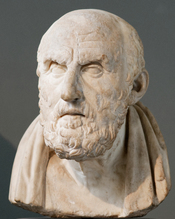"L'indifférence est le grand sommeil de l'âme."*
The term 'Stoicism' derives from the Greek word 'stoa,' meaning portico. A portico, or colonnade according to the Oxford Pocket English Dictionary (Revised Eighth Edition, 1996), is a "roof supported by columns at regular intervals, usu. attached as a porch to a building.". These were usually built outside (or inside) of temples, around gymnasia, dwelling-houses and open areas. In the marketplace of Athens, there existed the 'Stoa Poekile' (painted porch), a portico near the Agora. This was where the first Stoics came to hear their master teach, and hence this was how they obtained their title as 'Stoics'.
Stoicism was arguably the most prominent school of Greek philosophy. Inaugurated by Zenos of Citium (334-262 BC) a little before 330 BC, Stoicism, along with Epicureanism, ushered in the new Hellenistic era in philosophy and was said to be one of the primary and most influential doctrines in Greece until the third century AD, when it was supplanted by Neo-Plantonism.
It enjoyed the following of many adherents, in particular, those of the educated class. This was not only so in Greece; the school later flourished in Rome. In fact, it had significant influence on the growth of early Christianity ( e.g. "be in the world, but not of the world"). Among it's followers were the brilliant Greek writers Marcus Aurelius, Seneca and Epictetus.
As legend has it, Zeno lived a rugged, oppressive life. His neck was slightly twisted, he consumed raw food, drank mostly water, wore thin clothing, had a severe personality, and was ignorant to rain, heat and pain. One may find this to be barbaric, on the contrary however, this would be just and absolute for a Stoic. At the age of 22, Zeno arrived in Athens, consequent upon a...


